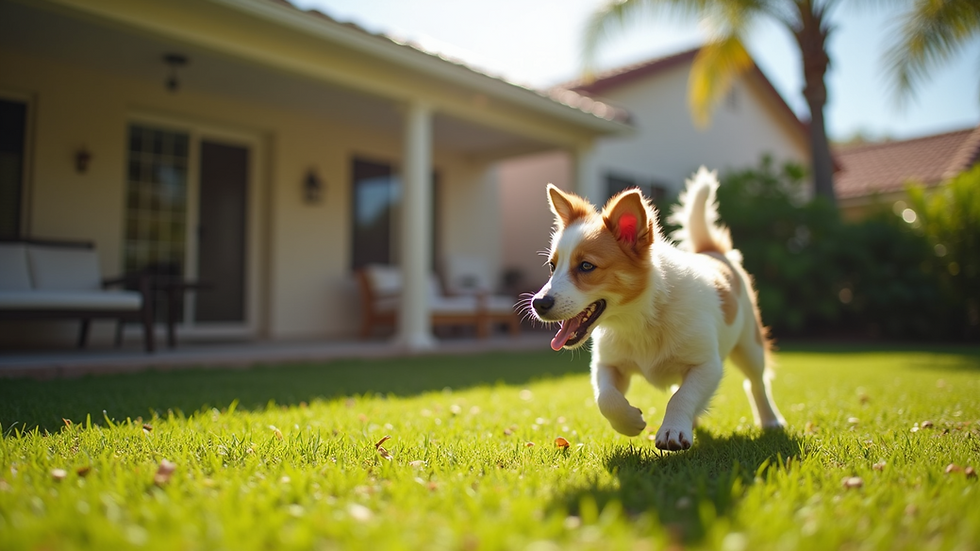Top Tips for a Pet-Friendly Lifestyle
- Calvin Gerald-Kornmann
- Oct 16, 2025
- 3 min read
Living with pets brings joy, companionship, and a unique set of responsibilities. Creating a home and lifestyle that supports your furry friends' well-being is essential for their happiness and your peace of mind. Whether you have a dog, cat, bird, or any other pet, adopting a pet-friendly lifestyle can make a significant difference in their quality of life. This guide offers practical tips and advice to help you build a nurturing environment for your pets.
Creating a Safe and Comfortable Home Environment
Your home should be a sanctuary for your pets. Safety and comfort are the foundation of a pet-friendly lifestyle. Start by pet-proofing your living space:
Remove hazardous items: Keep cleaning supplies, medications, and small objects out of reach.
Secure electrical cords: Pets may chew on cords, risking injury or damage.
Provide cozy resting spots: Soft beds or blankets in quiet corners help pets feel secure.
Maintain proper temperature: Ensure your home is neither too hot nor too cold for your pet’s breed and size.
Consider the layout of your home. Create designated areas for eating, sleeping, and playing. This helps pets understand boundaries and reduces stress.

Essential Daily Care for a Pet-Friendly Lifestyle
Daily care routines are vital to keep your pets healthy and happy. Here are some key practices:
Regular feeding schedule: Feed your pet at the same times each day with appropriate portions.
Fresh water availability: Always have clean water accessible.
Exercise and playtime: Dogs need walks and play; cats benefit from interactive toys and climbing structures.
Grooming: Brush your pet’s coat regularly to prevent matting and reduce shedding.
Health monitoring: Watch for changes in behavior, appetite, or appearance that may indicate health issues.
Incorporate mental stimulation through training sessions or puzzle toys. This keeps pets engaged and reduces destructive behaviors.

Traveling and Socializing with Pets
Traveling with pets or introducing them to new social environments requires preparation and care. Here are some tips:
Plan ahead: Research pet-friendly accommodations and transportation options.
Bring essentials: Pack food, water, toys, and any medications.
Use secure carriers or harnesses: Ensure your pet’s safety during travel.
Socialize gradually: Introduce your pet to new people and animals slowly to avoid stress.
Maintain routines: Try to keep feeding and exercise schedules consistent even when away from home.
If you need assistance with pet care during travel or busy days, consider professional services like pet friendly house sitting. This ensures your pet stays comfortable in their own environment.

Nutrition and Health: Building a Strong Foundation
Proper nutrition is the cornerstone of your pet’s health. Consult your veterinarian to choose the best diet based on your pet’s age, breed, and health conditions. Some guidelines include:
Balanced diet: Include proteins, fats, vitamins, and minerals.
Avoid harmful foods: Chocolate, grapes, onions, and certain artificial sweeteners can be toxic.
Treats in moderation: Use treats for training but avoid overfeeding.
Regular vet check-ups: Schedule annual exams and vaccinations.
Parasite prevention: Use flea, tick, and worm preventatives as recommended.
Healthy pets are more active and less prone to illness, making your pet-friendly lifestyle more enjoyable.
Enriching Your Pet’s Life with Activities and Companionship
Pets thrive on interaction and stimulation. Enrich their lives with activities that cater to their natural instincts:
For dogs: Daily walks, fetch games, agility training, and social playdates.
For cats: Climbing trees, laser pointers, and puzzle feeders.
For small animals: Exercise wheels, tunnels, and safe exploration time.
For birds: Toys, mirrors, and opportunities to fly in safe spaces.
Spending quality time with your pet strengthens your bond and reduces behavioral problems. Consider adopting a second pet if your current one enjoys companionship.
Maintaining a Clean and Organized Space
A clean home benefits both you and your pets. Here are some tips to keep your space tidy:
Regular cleaning: Vacuum pet hair and clean litter boxes daily.
Use pet-safe cleaning products: Avoid chemicals harmful to animals.
Organize pet supplies: Keep food, toys, and grooming tools in designated areas.
Manage odors: Use air purifiers or natural deodorizers.
A clean environment reduces allergens and creates a healthier space for everyone.
Embracing a Pet-Friendly Lifestyle Every Day
Adopting a pet-friendly lifestyle means integrating your pet’s needs into your daily routine. It requires commitment but offers immense rewards. By creating a safe home, providing proper care, and enriching your pet’s life, you build a loving environment where your pet can thrive.
Remember, if you ever need help caring for your pet while you are away, professional services like pet friendly house sitting can provide peace of mind and ensure your pet’s comfort.




Comments